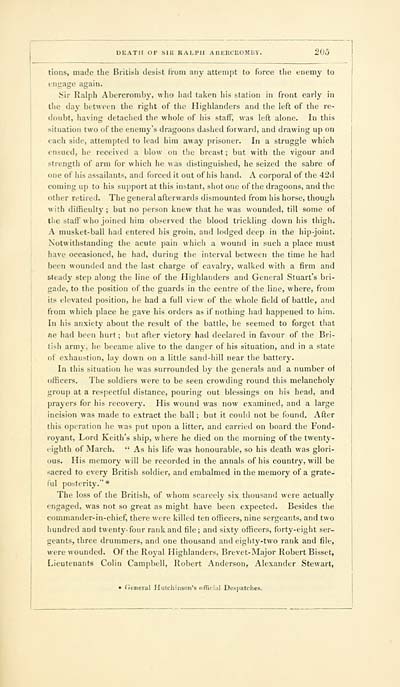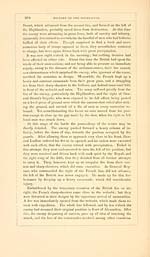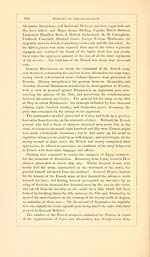Download files
Complete book:
Individual page:
Thumbnail gallery: Grid view | List view

UEATir OF SIR RALPH ABERCROMBT. 205
tions, made the British desist from any attempt to force tlie enemy to
eiitrage again.
Sir Ralph Abcrcromby, who liad taken his station in front early in
tlie day between tlic right of tlie llighhinclers and the left of the re-
doubt, having detached the whole of his staff, was left alone. In this
situation two of the enemy's dragoons dashed forwartl, and drawing up on
each side, attempted to lead him away prisoner. In a struggle which
ensued, he received a blow on tljc breast ; but with the vigour and
strength of arm for which he was distinguished, he seized the sabre of
one of his assailants, and forced it out of his hand. A corporal of the 42d
coming up to his support at this instant, shot one of the dragoons, and the
other retired. The general afterwards dismounted from his horse, though
with ditficulty ; but no person knew that he was wounded, till some of
tlie staff who joined him observed the blood trickling down his thigh.
A nmsket-ball had entered his groin, and lodged deep in the hip-joint.
Notwithstanding the acute pain which a wound in such a place must
have occasioned, he had, during the interval between the time he had
been wounded and the last charge of cavalry, walked with a firm and
steady step along the line of the Highlanders and General Stuart's bri-
gade, to the position of the guards in the centre of the line, where, from
its elevated position, he had a full view of the whole field of battle, and
from which place he gave his orders as if nothing had happened to him.
In his anxiety about the result of the battle, he seemed to forget that
ne had been hurt ; but after victory had declared in favour of the Bri-
tish army, he became alive to the danger of his situation, and in a state
of exhaustion, lay down on a little sand-hill near the battery.
In this situation he was surrounded by the generals and a number of
officers. The soldiers were to be seen crowding round this melancholy
group at a respectful distance, pouring out blessings on his head, and
prayers for his recovery. His wound was now examined, and a large
incision was made to extract the ball ; but it could not be found. After
this operation he was put upon a litter, and carried on board the Fond-
royant. Lord Keith's ship, where he died on the morning of the twenty-
eighth of March. " As his life was honourable, so his death was glori-
ous. His memory will be recorded in the annals of his country, will be
sacred to every British soldier, and embalmed in the memory of a grate-
ful posterity."*
The loss of the British, of whom scarcely six thousand were actually
engaged, was not so great as might have been expected. Besides the
commander-in-chief, there were killed ten officers, nine sergeants, and two
hundred and twenty- four rank and file; and sixtj' officers, forty-eight ser-
geants, three drummers, and one thousand and eighty-two rank and file,
were wounded. Of the Royal Highlanders, Brevet-Major Robert Bisset,
Lieutenants Colin Campbell, Robert Anderson, Alexander Stewart,
• fJeneral Hutchinson's rifiici;il Despatches.
tions, made the British desist from any attempt to force tlie enemy to
eiitrage again.
Sir Ralph Abcrcromby, who liad taken his station in front early in
tlie day between tlic right of tlie llighhinclers and the left of the re-
doubt, having detached the whole of his staff, was left alone. In this
situation two of the enemy's dragoons dashed forwartl, and drawing up on
each side, attempted to lead him away prisoner. In a struggle which
ensued, he received a blow on tljc breast ; but with the vigour and
strength of arm for which he was distinguished, he seized the sabre of
one of his assailants, and forced it out of his hand. A corporal of the 42d
coming up to his support at this instant, shot one of the dragoons, and the
other retired. The general afterwards dismounted from his horse, though
with ditficulty ; but no person knew that he was wounded, till some of
tlie staff who joined him observed the blood trickling down his thigh.
A nmsket-ball had entered his groin, and lodged deep in the hip-joint.
Notwithstanding the acute pain which a wound in such a place must
have occasioned, he had, during the interval between the time he had
been wounded and the last charge of cavalry, walked with a firm and
steady step along the line of the Highlanders and General Stuart's bri-
gade, to the position of the guards in the centre of the line, where, from
its elevated position, he had a full view of the whole field of battle, and
from which place he gave his orders as if nothing had happened to him.
In his anxiety about the result of the battle, he seemed to forget that
ne had been hurt ; but after victory had declared in favour of the Bri-
tish army, he became alive to the danger of his situation, and in a state
of exhaustion, lay down on a little sand-hill near the battery.
In this situation he was surrounded by the generals and a number of
officers. The soldiers were to be seen crowding round this melancholy
group at a respectful distance, pouring out blessings on his head, and
prayers for his recovery. His wound was now examined, and a large
incision was made to extract the ball ; but it could not be found. After
this operation he was put upon a litter, and carried on board the Fond-
royant. Lord Keith's ship, where he died on the morning of the twenty-
eighth of March. " As his life was honourable, so his death was glori-
ous. His memory will be recorded in the annals of his country, will be
sacred to every British soldier, and embalmed in the memory of a grate-
ful posterity."*
The loss of the British, of whom scarcely six thousand were actually
engaged, was not so great as might have been expected. Besides the
commander-in-chief, there were killed ten officers, nine sergeants, and two
hundred and twenty- four rank and file; and sixtj' officers, forty-eight ser-
geants, three drummers, and one thousand and eighty-two rank and file,
were wounded. Of the Royal Highlanders, Brevet-Major Robert Bisset,
Lieutenants Colin Campbell, Robert Anderson, Alexander Stewart,
• fJeneral Hutchinson's rifiici;il Despatches.
Set display mode to: Large image | Transcription
Images and transcriptions on this page, including medium image downloads, may be used under the Creative Commons Attribution 4.0 International Licence unless otherwise stated. ![]()
| Early Gaelic Book Collections > Ossian Collection > History of the Highlands and of the Highland clans > Volume 4 > (223) |
|---|
| Permanent URL | https://digital.nls.uk/79668332 |
|---|
| Description | Vol. IV. |
|---|---|
| Shelfmark | Oss.250 |
| Attribution and copyright: |
|
| Description | Selected books from the Ossian Collection of 327 volumes, originally assembled by J. Norman Methven of Perth. Different editions and translations of James MacPherson's epic poem 'Ossian', some with a map of the 'Kingdom of Connor'. Also secondary material relating to Ossianic poetry and the Ossian controversy. |
|---|
| Description | Selected items from five 'Special and Named Printed Collections'. Includes books in Gaelic and other Celtic languages, works about the Gaels, their languages, literature, culture and history. |
|---|

